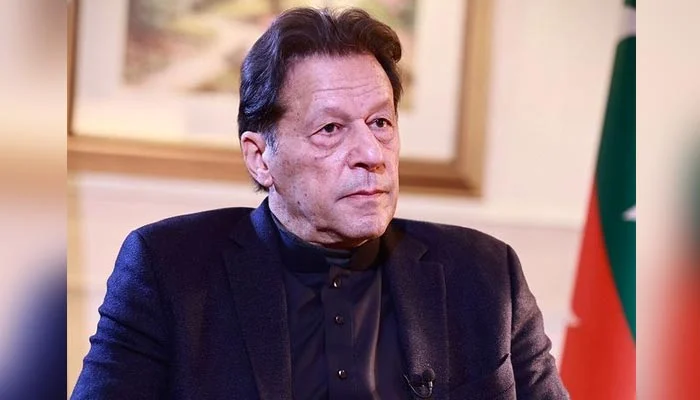- PTI “sacrificed” two assemblies for polls, Khan says.
- He claims incumbent govt in power via horse-trading.
- Transparent polls crucial to steer out of economic crisis.
Pakistan Tehreek-e-Insaf (PTI) Chairman Imran Khan said on Wednesday that his party currently had no contact with the new military leadership.
The deposed prime minister, speaking during an interview with BBC Urdu, denies links with army chief General Syed Asim Munir and claimed that the general elections will take place in April 2023.
Blaming former army chief Gen (retd) Qamar Javed Bajwa for “helping the government in ruling the country”, the PTI chief predicted that the government will now be “forced to hold general elections this April”.
“When they came into power, they ended their corruption cases worth Rs1,100 billion,” he said.
Censuring the incumbent government for the economic crisis in the country, the former premier said that Pakistan’s economic conditions were never like this, emphasising that fair and transparent polls are the only solution to these problems.
“The current government led by Prime Minister Shehbaz Sharif has come into power through horse-trading,” claimed the PTI chief.
The PTI chief added that the coalition rulers have kept themselves above the law and ended the corruption cases that they were booked in years back. “Shehbaz Sharif, Nawaz Sharif, Asif Zardari, and Maryam Nawaz — all of their cases have been forgiven.”
He said that in a bid to move towards free and fair elections, his party “sacrificed” two assemblies — Khyber Pakhtunkwa and Punjab. “Now this government will be forced into holding elections in April.”
‘Sri Lanka-like situation’
Explaining the reason behind the ongoing economic crisis, the ex-PM said that no investor or businessperson trusts the incumbent government and neither do foreign investors.
“Pakistan has been plunged into a quagmire. To save the country from a Sri Lanka-like situation, we need free and fair elections,” the PTI chairman said.
Khan said he feared another economic crisis was in the offing as the foreign exchange reserves had depleted to $4 billion and commodities of the same value were stuck at the ports because of the shortage of dollars.
“The prices of commodities are rising, unemployment is increasing, and industries are shutting down,” the PTI chief said.
Pakistan’s economy has crumbled alongside a simmering political crisis, with the rupee plummeting and inflation at decades-high levels, while devastating floods and a major shortage of energy have piled on further pressure.
The South Asian nation’s enormous national debt — currently $274 billion, or nearly 90% of gross domestic product — and the endless effort to service it makes Pakistan particularly vulnerable to economic shocks.
Establishment’s role in Punjab
Shedding light on the political situation in Punjab, the former prime minister said that the establishment tried to make Parvez Elahi the chief minister with Pakistan Muslim League-Nawaz’s (PML-N) backing.
“Elahi was loyal to us, we had to return the favour and now they will be merged in PTI and become a part of us,” the former premier said.
He further added that “someone should ask them why had they brought down our government through a foreign conspiracy?”
Khan went on to say that the economy under our government was performing very well in 17 years. What were we doing wrong that our government was brought down?”
The former premier maintained that after ousting PTI from power, now they are unable to maintain the economy, adding that “Gen Bajwa was told that if this conspiracy becomes successful then the economy could not be sustained.”
They could not maintain the economic condition and the market immediately lost confidence in the incumbents, the former premier added.
After assuming power, they realised that they did not have any road map for ameliorating the economic conditions of Pakistan.


 Latest News3 days ago
Latest News3 days ago
 Latest News3 days ago
Latest News3 days ago
 Entertainment3 days ago
Entertainment3 days ago
 Latest News3 days ago
Latest News3 days ago
 Latest News3 days ago
Latest News3 days ago
 Latest News3 days ago
Latest News3 days ago
 Latest News3 days ago
Latest News3 days ago
 Latest News3 days ago
Latest News3 days ago























